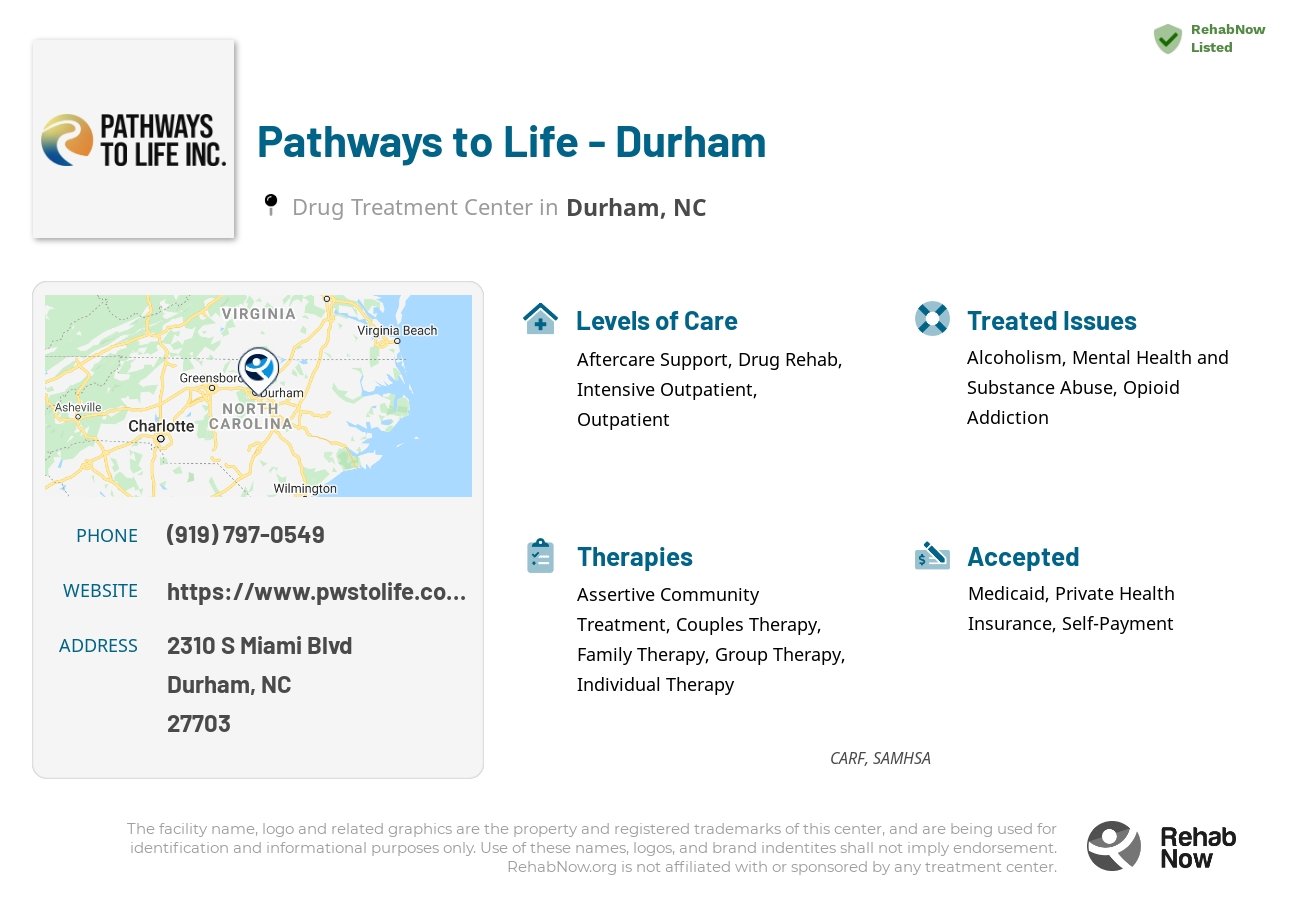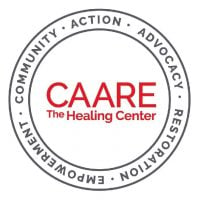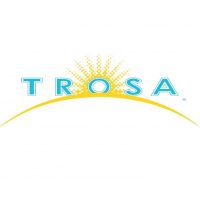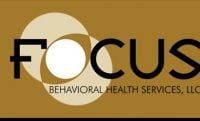
Pathways to Life - Durham
Drug Rehab Center in Durham, North Carolina
- Opioid Addiction
- Dual Diagnosis
- Drug Addiction
- Alcoholism
Pathways to Life - Durham is an addiction treatment facility in Durham, North Carolina that offers specialized care for individuals affected by alcohol and drug abuse, providing comprehensive treatment services, tailored to meet individual needs, including detoxification, drug rehab, intensive outpatient, and aftercare support, with a focus on the physical, psychological, and spiritual aspects of recovery.
About This North Carolina Facility
Pathways to Life - Durham is an addiction treatment facility located in Durham, North Carolina. Established in 2006, the center provides specialized care for people who are affected by alcohol and drug abuse. It offers comprehensive treatment services such as detoxification, drug rehab, intensive outpatient, and aftercare support. Pathways to Life - Durham is accredited by the Commission on Accreditation of Rehabilitation Facilities (CARF) and certified by the Substance Abuse and Mental Health Services Administration (SAMHSA). Private health insurance is accepted for payment of treatment services.
Pathways to Life - Durham’s treatment services are tailored to meet the individual needs of each patient. They offer specialized services to those with dual diagnosis, opioid addiction, alcohol addiction and other substance abuse disorders. Treatment focuses on the physical, psychological and spiritual aspects of recovery, with evidence-based interventions such as medication-assisted treatment, individual and group counseling, relapse prevention, and life skills training. In addition, they provide comprehensive aftercare support to ensure patients continue on the path to long-term recovery.
Genders
Ages
Modality
Additional
Accreditations
SAMHSA

CARF
The Commission on Accreditation of Rehabilitation Facilities (CARF) is a non-profit organization that specifically accredits rehab organizations. Founded in 1966, CARF's, mission is to help service providers like rehab facilities maintain high standards of care.
Conditions and Issues Treated
Opioids are a set of drugs prescribed for pain relief. Health care providers prescribe opioids for relief of severe pain after major surgeries and in conditions like cancer. Oxycodone, fentanyl, oxymorphone, hydrocodone, codeine, and morphine are some of the commonly prescribed opioids. They also include illegal drugs of abuse like heroin. Opioid addiction refers to the compulsive seeking of opioids, even when they are not required medically.
Opioid addiction treatment involves medication-assisted therapy (MAT) in which medicines, counseling, and behavioral therapies are all employed. Opioid addiction treatment is a comprehensive approach at Pathways to Life - Durham in Durham, NC that boosts the treatment success rate and provides sustained recovery.
Levels of Care Offered at Pathways to Life - Durham
This center offers a variety of custom treatment tailored to individual recovery. Currently available are Aftercare Support, Drug Rehab, Intensive Outpatient, Outpatient, with additional therapies available as listed below.
Intensive outpatient programs (IOP) comprise regular visits to the North Carolina facility that provides the therapy. IOP is suitable for patients who have been treated in residential treatment programs. Pathways to Life - Durham‘s patients gradually get back to their routine life.
Facilities like Pathways to Life - Durham offer a variety of services, such as individual and group counseling and family therapy. During the sessions, you work with a team of experts that include: General physicians, Psychiatrists, Social Workers, and Psychologists. The main goals of outpatient recovery programs are to help addicted individuals reduce drug use and addictive behaviors, eventually becoming entirely sober.
Treatment is just a first step in sustaining sobriety. After rehabilitation, counseling for aftercare helps the person adapt to a life without drugs. A sober living facility in Durham, job therapy, or educational assistance may be included in this service, managed by Pathways to Life - Durham. This is when a preventive strategy for relapse starts to take shape.
Therapies & Programs
Therapy plays a major role in addiction recovery. It encourages patients to get to the root of their addiction and learn how to better handle the issues that led to using. Therapy can be conducted in group and one on one settings. In Pathways to Life - Durham‘s individual therapy, the patient meets with the therapist in a one on one setting. This allows them to focus on the underlying issues of addiction and come up with solutions to prevent future abuse.
One of the most common areas of stress and damage during addiction is in intimate relationships. Addiction involves everyone in a family, not only the addict. Couples therapy can rebuild trust and joy that may have been damaged.
When the whole family is involved, healing can be far more successful. Family counseling involves genetic factors to the family of the addict. This offers the means to cope with addiction and its underlying emotional disorders for loved ones. It is a helpful method for addicts in helping to adjust to sober living.
Payment Options Accepted
For specific insurance or payment methods please contact us.
Is your insurance accepted?
Ask an expert, call (888) 674-0062
Pathways to Life Associated Centers
Discover treatment facilities under the same provider.
- Pathways to Life - Selma in Selma, NC
- Pathways to Life - Greensboro in Greensboro, NC
- Pathways to Life in Greenville, NC
Learn More About Pathways to Life Centers
Additional Details
Specifics, location, and helpful extra information.
Durham, North Carolina 27703 Phone Number(919) 797-0549 Meta DetailsUpdated November 25, 2023
Staff Verified
Patient Reviews
There are no reviews yet. Be the first one to write one.
Durham, North Carolina Addiction Information
North Carolina ranks 29th in the nation for overall substance abuse. Many of the drugs abused in the state are illicit, and many of these are opioids. Prescription opioids are readily available due to the high rates of medical workers prescribing them. The number of prescriptions has increased tenfold since the 1980's. Opioid overdoses are the most common type of death in North Carolina.
Over 8% of the population in Durham abuses drugs, and this number continues to rise. Prescription opioids, heroin, and cocaine are the most commonly abused drugs in the city. Marijuana is also a problem, with many people using it as their first drug. About 26% of HIV/AIDS cases are attributed to injection drug use. Local officials have started to offer various programs to help those affected by addiction.
Treatment in Nearby Cities
- Albemarle, NC (86.4 mi.)
- Spring Lake, NC (53.7 mi.)
- Elizabethtown, NC (91.4 mi.)
- Pineville, NC (129.6 mi.)
- Midway Park, NC (119.1 mi.)
Centers near Pathways to Life - Durham
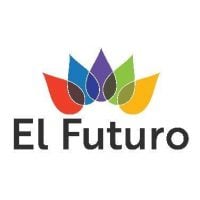
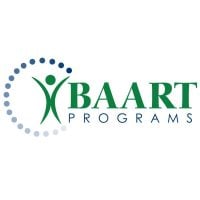

The facility name, logo and brand are the property and registered trademarks of Pathways to Life - Durham, and are being used for identification and informational purposes only. Use of these names, logos and brands shall not imply endorsement. RehabNow.org is not affiliated with or sponsored by Pathways to Life - Durham.



